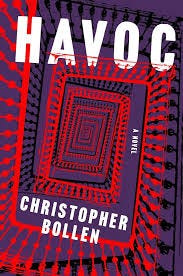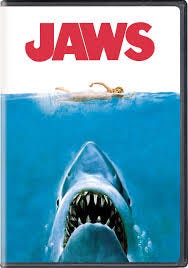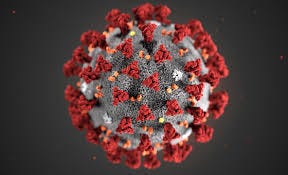Havoc by Christopher Bollen
Cry havoc and let slip the dogs of Covid
Something I think about now and again is that we have yet to see The Great Art of COVID. What I mean to say is that major, world-altering events generate art that resonates at a similar scale. Think of all the protest songs that were created in response to the Vietnam War, or The Great Gatsby in relation to the Roaring 1920s. I don’t think we’ve quite seen that caliber of artistic expression in relation to the SARS-CoV-2 pandemic, and while plenty of art has been made in response to that time, I don’t know that we’ve seen the definitive piece or movement yet.
I’m not going to suggest that Havoc by Christopher Bollen is that expression, but if this is the start of a wave of COVID art, we could do much, much worse. Mask up, and let’s get into it.
Spoiler-Free Summary
Maggie is an 80-something year old widower riding out the COVID pandemic in a luxurious but run-down hotel in Egypt. Maggie’s…hobby? Calling? Addiction?…is assessing other’s relationships, and meddling with their life in the way she thinks best. When 8 year old Otto and his mother Tess arrive at the hotel, Maggie soon finds that she may have met her first worthy adversary in Otto, beginning a dangerous game between the two.
The Good
Havoc has an impeccable sense of rhythm. It reads like the famous theme to Jaws, building tension from a slow burn into a fever pitch with deliberate, even steps. The novel starts lazily, with Maggie idling away her days in the scorching heat of the Sahara, going through her mundane routines and spending time pondering how she ended up where she is, or nosing into other guests’ lives as your everyday busybody. By the end, everything she (and we) know of her world is completely blown apart and torn asunder both from within and without. The line connecting the two points is almost perfectly a 45 degree incline on a graph of tension vs time.
Speaking of the ending, what an ending it is. I won’t give it away here as it all works best if you come to it completely blind. I will just say that I finished the book, put it down, and stared into space for several minutes while my brain swirled everything around, re-tracing through the story and reassessing my understanding of the plot and characters. It’s a gut punch that leaves you breathless in all the right ways.
The characters are all multi-layered and lovable in their own unique ways. The following will sound cryptic, but those who have finished Havoc will know what I mean: even the villains of the story, by the (very) end, are shown to be endearing. The most minor of background characters seem to have, if not detailed backstories, at least some indication that they are not cardboard cutouts there to get the story from point A to point B. The Royal Karnak1 felt alive.
Lets talk about The Royal Karnak for a moment. I loved the setting of Havoc. The hotel is almost a character unto itself, and the COVID pandemic (much more on that in a moment) is the looming specter hanging over all. Very few scenes happen outside of the hotel gates, and with good reason2, which sounds restrictive here but in the novel allows a kind of focus on a select number of characters, all of whom have very important roles to play. I think there is a deeper meaning to be mined from The Royal Karnak as well. The hotel is very luxurious, with lovely amenities, a prime location, and attentive, doting staff. At the same time, it is falling into disrepair, and anything more than a cursory glance shows that just below the surface, the hotel is dying, rotting from the inside out, like a shiny red apple that you bite into and find to be brown, mealy, and sour. Very much like our characters, each of whom plays at being fun-loving vacationers but are harboring darker secrets. Very much like the lie they live that they are having a grand time by the pool by choice, when most of them can’t use their passport to leave and death is lurking at the hotel gates. Very much like Maggie and Otto, who….well, you’ll have to read the book.
The Bad
I suspect there are a number of readers who will get 10-15% through this book and abandon it. Who cares about an old lady waiting to die in some moldering hotel? Havoc’s rhythm and pace, which I just praised a few paragraphs ago, also means that the very beginning of the story is purposefully slow. It has to be; otherwise, it’s like making shadow puppets inside a closet - you won’t see any of the shadows without the contrast of light.
Still, I could see how some might not be patient enough to wait for it to “get good”, so to speak. If you find yourself in that position, my advice: there is a point not too far in where you will viscerally3 feel the tone and story shift. Wait for it.
Personal Experience
There is so much to unpack here. I’ll give you a few of my insights, but this is by no means exhaustive:
Havoc is a novel about how no person, nor any relationship, is an island. The central conflict and thrust of the story is the adversarial relationship between Maggie and Otto. They certainly do enough damage to each other, but the majority of the destruction is collateral. In the course of trying to hurt one another, they mangle others’ relationships, the Royal Karnak itself, plenty of other guests, and even Egyptian culture!4 As we learned during COVID, selfishness can kill.
Havoc is a novel about lifetimes. It’s no coincidence that Maggie is almost exactly 10 times Otto’s age. Nor that no one else in the novel is younger than Otto nor older than Maggie. They represent the bookends of life. Appropriately, we see how they are both different, and also really very much the same.
Havoc is a novel about the lies we tell ourselves. Most characters in the novel are deceiving themselves about one thing or another. Without giving too much away…Zachary lies to himself that he hasn’t grown up, while Ben misleads himself that he has. Tess has obscured herself from the truth of her marriage and her child. Maggie…hoo boy.
If all of these sound suspiciously like traits and lessons learned during COVID, I don’t think that’s by accident.
Memorable Quotes
Moments of extreme intimacy can often result in the drawing of colder boundaries.
A good thing to text your ex.
Here’s a warning to keep in mind for your own future disasters. You can only withstand losing everything in your life once. There can be no second time.
That last sentence is…ominous.
Of course a child can appeal to the public in a way the elderly cannot; there’s a reason little girls sell cookies door-to-door and not the old hags who bake them. What if I showed up, fingers ropy and withered, trying to entice harried fathers into buying coconut covered biscuits?
Never really thought about it like that, but it does make a certain sense.5
The small and frail can be conquered - that is an American fact.
Oof.
Six years ago, on his deathbed, could Peter have imagined a virus ripping apart the patchwork of nations that quilted the world? Would he have believed me had I been able to explain the future to him? In a few years, sweetheart, a deadly plague will spin the earth faster than it was ever meant to turn and millions of people will go flying off the face of it - the rich and the poor, the ignorant and the blessed.
Double oof.
Grief has no sense of theater, it nestles itself into the most ordinary corners of the day.
Dare I say…triple oof.
Believe it or not, I want people to be happy. Or if not happy, then free. I don’t meddle, that’s not how I think of it. No, I engineer a fork int he road, the miraculous moment when the prison door falls open, the rare and precious possibility of a second chance.
Not sure everyone else feels that way, Mags.
Rating
Havoc, you have received the rare honor of 4.75 Sphinxes6
I really adored this book. It was gripping and thrilling, but also gave me a lot to think about over the following days. Highly recommended.
Next Up
Finally, we’ll take a break from the dark and twisty with…
Until then, keep it under wraps like King Tut.
The fictional hotel mentioned in the summary.
Again, COVID. Plus, the main character is elderly and can’t get around quite as well as she’d like. And…other reasons that I can’t get into here without ruining things.
I mean that literally, as in, there is much viscera involved.
I admit that last one is a stretch but it’s not untrue.
A strange COVID consequence, Girl Scout cookies sold 15 million boxes in 2021, compared to 200 million in normal years.
Sphinxes? Sphinxeses? Sphinxii?







